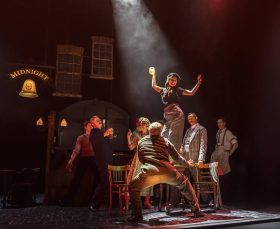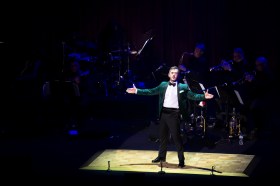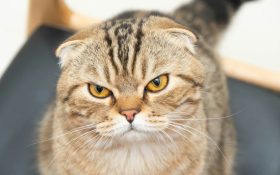By the opening of the London Olympics in 2012, fifty years will have passed since Newsweek cited Charles de Gaulle’s wry enquiry as to how anyone could be expected to “govern a country that has 246 varieties of cheese?”. Half a century and around 240 kilometres away across the Channel, Keith Khan’s challenge as Head of Culture for the London 2012 Cultural Olympiad seems rather more daunting and his subjects more expectant than your average Roquefort.
So just how do you coordinate a celebration of culture in a nation whose capital alone hears over 300 languages spoken every day?
“Well I certainly don’t think that one size fits all,” Khan affirms with the faintest of dry laughs.
When asked how he envisions the teasing out of London’s cultural strands whilst maintaining a broad appeal to the watching world, his answer is disarmingly simple: “I think that the more you localise, the more you internationalise; by focusing on the very local, you can make something that appeals to the whole world.
“We need to reflect the fact that London is a world city,” he continues, “but all of us are diverse. We play multiple identities all the time and I think we’ve got to understand that, rather than going: ‘This is a project that is for Greek people’, because that doesn’t work any more.”
A trained and practising artist for his whole life, Khan’s emphasis rests strongly on the facilitation of arts events within communities, providing them with the tools to create their own expressions of culture rather than prescribing a framework within which this expression must form itself.
“You need to be very sophisticated in order to communicate culture differently”, he states.
“The more you invest in excellence driven from a particular community, the more interesting it will become.”
His substantial background as a carnivalist has been a major influence in both his own work and his approach to community projects, and has led to a love of arts on a grand scale. Past posts have included a place on the creative team responsible for the Millennium Dome’s central and opening show, Director of Design for the 2002 Manchester Commonwealth Games, and Artistic Director for the Queen’s Golden Jubilee Commonwealth celebrations, for which he developed an education project involving 72 countries.
“I have a background in tying together high level excellence and spectacle, but rooted in people and communities. So I suppose that fits the job description of Head of Culture,” he muses, supposing correctly and understating massively.
In fact despite the scads of impressive official titles he holds and has held – including that of member of the Arts Council of England – his favourite remains that of “spectacularist”.
“I like the title a lot,” he says, “because I think people are drawn to colour, light and excitement and what I like doing is creating really big structures that lots of individual talent can show in.
“I’ve worked with lots of community organisations but created a really strong structure that will make it iconic for them, so they can still do what they do.”
The Olympiad is a four-year celebration of culture spanning the United Kingdom, and will officially begin following the closing ceremony of this year’s Beijing Olympics. Khan’s undertaking is ambitious, but his attitude of facilitation over dictation, and the fragmentation of what is a mammoth project into realistic and manageable parts give the probable outcome a rosy hue.
“We’ve got to understand that our focus is on three things: welcoming the world, inspiring and engaging young people and leaving a legacy,” he stresses.
“The last show I made was over here for the Melbourne festival in 2006,” he recollects, “and I got back to the UK and thought: ‘Something really needs to change, and the only way you can change it is if you get involved in the system.'”
Getting involved certainly emerges as one thing Khan does without hesitation. It is this spirit of integration across all borders which drives his belief in the support and sharing of communities’ own traditions – hence the recurrent reference to the carnival format.
A major part of the success of carnival experiences for diverse communities lies in the celebration of their own arts while also participating in and appreciating those of the people around them. Khan’s belief is that this celebration can lie just as much in the creative process and its presence.
“You can have largely Caribbean nurses sewing forty thousand sequins onto a piece of net,” he cites, “and then people having a glass of rum in the corner, but all of that adds up to a creative experience.”
Another branch of his carnivalist’s enthusiasm and a significant focus in Khan’s vision for the Olympiad is the exploration of youth engagement with community and the arts.
“I’m especially interested in young people who don’t necessarily have a space as yet, and the street is a space that is commonly used by young people. [It] costs nothing to go into and… can be a place that you can bring people together in. So a carnival for me represents that.”
Khan’s interest in the stimulation of cultural engagement in Britain’s youth leads into a desire to harness the pull of design, digital arts and fashion, areas to which younger generations increasingly turn to find cultural fulfilment or inspiration. This rapidly evolving trend of digital and online interaction – even with its creative output – might strike fear into the heart of another devotee of community cultural participation, but Khan remains pragmatic, and clearly fascinated to boot.
“The digital world we’re moving into is going to be so complicated by 2012,” he enthuses.
“London’s Olympics does have a strong digital component. You’ve got to engage with the digital future because there’s no point just thinking about creating new shows [when] that’s not really going to be the future’s culture.
“Some of the very localised or youth-oriented activities will happen under that banner, so you might be able to go to the island of Shetland and find something very specific because you found it online,” he explains.
“I think that’s going to be very imaginative as opposed to rolling in and seeing The Lion King and Spamalot.”
While Khan is quick to point out that both of these latter examples have their merits, they are manifestly not the essence of the London he sees around him.
“What’s interesting about London is that you can have someone like Sami Yusuf, who is a musician, have a sell-out event at Wembley with ten thousand people, but there are people in London who will never even know who he is.”
The Olympiad is a chance for Londoners – and the rest of the world – to get to know and celebrate one another for their differences as well as their similarities.
“Knowledge is what can empower communities,” he says, “and our role is really to enable as opposed to dictate.
“For many people it’s a mystery how you get involved in creativity, so I hope that I’m able to make it easier for people to make creative things, and hearing different voices has to be an important part.”
As for Khan’s own career, it must simmer humbly on the back burner until the tumult of 2012 has drawn to a close – albeit one which Khan hopes will not be final.
“I hope that at the end of it I can go back to being an artist, as it were,” he admits with only the most fleeting hint of a sigh, “but in a world where people understand that you’re not just mad to work digitally, or you’re not just mad to work with communities, and that you can create spectacle in this way.
“Not everybody aspires to having single shows in galleries,” he concludes.
“I’d hope that we can substantially shift the cultural landscape.”




